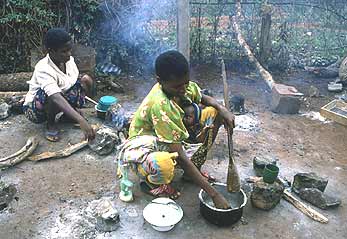Feature: Congolese refugees put homecoming dreams on hold
Feature: Congolese refugees put homecoming dreams on hold

LUGUFU, Tanzania (UNHCR) - Just 16 years old, Francine Afsa has lived more than a quarter of her life in this refugee camp in western Tanzania. She has been here with her parents, nine brothers and two sisters since 1999, having already spent a short time in Tanzania as a refugee in 1996 when a Tutsi-led rebellion broke out in her homeland, the Democratic Republic of the Congo (DRC, formerly Zaire).
She regards her future in the camp bleakly: "It will get worse and worse. There is no hope for my life. I'm like someone who's in jail."
"I would love to go back to Congo once peace is restored," says this articulate, forthright teenager. "But for the moment peace is only a dream because there is no solution for the DRC. I am losing hope of going home."
Francine speaks for many of the nearly 87,000 Congolese refugees living in the two sprawling camps of the Lugufu complex, who see little prospect of going back to their homeland any time soon. With Congolese refugees still arriving from fighting in eastern DRC, Tanzanian authorities have recently given the UN refugee agency permission to receive an additional 4,000 refugees in Lugufu II.
Medar Mwanuke, a 53-year-old pastor, just arrived with his wife and two small children two weeks ago. He had been a refugee between 1965 and 1968 and says, "I never thought I would be a refugee again."
He says his family decided to flee rebels of the Congolese Rally for Democracy (RCD-Goma) faction who were looting and burning houses in the Kalimi region of eastern DRC. "The situation in eastern Congo will not change very soon because the government in Kinshasa and the warring factions do not have a concrete agreement," says the pastor. "They are still pulling strings."
When Lugufu was first opened in 1996, the shelters were makeshift, but after full-scale war erupted in 1998 - involving troops from neighbouring countries - refugees began building more solid houses from mud bricks. Today, having resigned themselves to what could be a long stay as refugees, many are growing their own crops on their assigned plots of land, giving a lush green look to the camp.
A tailor who came to the camp in 1997 now says with a sigh, "I thought I would be able to go home the same week. I am very sad" to be here so long.
Kennedy H. is a more recent arrival. The 26-year-old son of a Tutsi mother and a father from the Mufuliru ethnic group, he says his family was persecuted in eastern DRC because of the mixed marriage. Three years ago, he says, local militias came to his home and told the family, "You are Tutsis, you should not stay here." He says they killed his older sister on the spot, and detained his mother for a while.
He was away from the house at the time, and when he got word of what had happened, he fled immediately, with only the clothes on his back, the equivalent of $20 in his pocket and his national ID card.
"Since that time I have not heard any message from them," says Kennedy, whose uncle named him after his political hero, the late American president John F. Kennedy. "But a few days ago, [newly-arrived refugees] told me 'your parents were killed'.
"When somebody's your neighbour and he comes and tells you your parents are dead, you believe him." He feels the message was also a covert threat and says he feels unsafe as a child of a Tutsi in a camp where nearly all the refugees are from the Bemba ethnic group.
The news of his parents' death - and the fact that his three brothers and four remaining sisters are now dispersed and on their own - haunts him. "I can't eat any more; I lost four kilos in a few days. Before, when I got some message from home, it couldn't touch me. But when I got the message that my parents are dead and my little brothers are scattered, it hit me very hard. As the oldest boy and because of my standard of education, I am the one who should have taken care of them. Maybe I should have stayed with them."
Fluent in English and French, as well as a number of African languages, Kennedy also compiles a camp newspaper in Swahili, and takes his mind off his worries by writing poetry in English. "Peace, peace, you're simple to pronounce, but not easy to get once you're lost," run the lines of one poem.
He too has few hopes that peace will come to his homeland soon. "The situation in the Congo is getting worse and worse because there are still new arrivals in the camps," says Kennedy. "There are still ethnic clashes, and no peace deal lasts more than three months. It doesn't make me very hopeful."
For therapy, he pours out his feelings in his poetry, as he concludes in one poem, "Remember, God will not create another world for us, so let's find a solution."
By Kitty McKinsey
UNHCR Regional Office in Nairobi, Kenya








